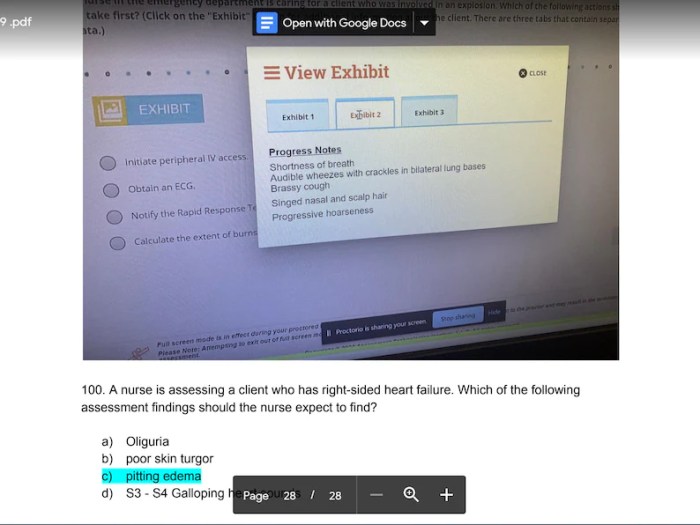Ati medical surgical proctored exam 2019 – The ATI Medical-Surgical Proctored Exam 2019 stands as a crucial milestone for aspiring healthcare professionals, serving as a comprehensive assessment of their knowledge and skills in the field of medical-surgical nursing. This exam not only evaluates candidates’ understanding of core concepts but also their ability to apply that knowledge in real-world patient care scenarios.
Embarking on a journey to conquer this exam requires a strategic approach, effective preparation, and a deep understanding of the exam’s content and format.
Delving into the intricacies of the ATI Medical-Surgical Proctored Exam 2019, this guide provides a roadmap to success. It unravels the exam’s structure, content areas, and scoring system, empowering candidates with the insights necessary to tailor their preparation strategies. Moreover, it delves into proven study methods, time management techniques, and practice question utilization, equipping candidates with the tools to maximize their exam performance.
1. ATI Medical-Surgical Proctored Exam 2019 Overview

The ATI Medical-Surgical Proctored Exam 2019 is a standardized assessment designed to evaluate the knowledge and skills of nursing students in medical-surgical nursing. This exam is an essential step in the preparation for the NCLEX-RN examination and provides valuable insights into areas where students may need additional support.
Exam Format, Content Areas, and Scoring System, Ati medical surgical proctored exam 2019
- Format:Computer-based exam with 150 multiple-choice questions
- Content Areas:
- Medical-Surgical Nursing
- Pharmacology
- Nutrition
- Pathophysiology
- Scoring System:Scaled score ranging from 200 to 800, with a passing score of 500
2. Preparation Strategies: Ati Medical Surgical Proctored Exam 2019
Effective Study Methods and Resources
Effective preparation for the ATI Medical-Surgical Proctored Exam requires a comprehensive approach. Utilize textbooks, online resources, and practice questions to reinforce concepts and assess understanding.
Time Management and Prioritization
Time management is crucial. Create a study schedule that allocates sufficient time for each content area. Prioritize studying areas where you need additional support and gradually move on to more familiar topics.
Practice Questions and Mock Exams
Practice questions and mock exams are invaluable for self-assessment. Identify areas of strength and weakness, and focus on improving weaker areas. Utilize online question banks and ATI’s practice exams to simulate the actual exam experience.
3. Content Analysis
Medical-Surgical Nursing
- Assessment and management of common medical-surgical conditions
- Patient care planning and implementation
- Medication administration and monitoring
- Wound care and infection control
Pharmacology
- Drug classifications, actions, and side effects
- Medication calculations and administration
- Pharmacokinetics and pharmacodynamics
- Drug interactions and adverse reactions
Nutrition
- Nutritional assessment and counseling
- Dietary modifications for various medical conditions
- Enteral and parenteral nutrition
- Fluid and electrolyte balance
Pathophysiology
- Cellular and molecular basis of disease
- Pathological processes and their clinical manifestations
- Etiology, diagnosis, and treatment of common diseases
- Alterations in body systems and their impact on patient care
4. Test-Taking Strategies

Time Management
Manage time effectively by allocating a specific amount of time to each question. Avoid spending too much time on any one question and move on if you are unsure of the answer.
Answering Question Types
Familiarize yourself with the different question types, such as multiple-choice, fill-in-the-blank, and true/false. Develop strategies for answering each type effectively.
Handling Challenging Questions
When encountering challenging questions, remain calm and use process of elimination to rule out incorrect answers. If possible, make an educated guess and move on.
5. Post-Exam Analysis
Reviewing Exam Results
After the exam, review your results carefully to identify areas where you excelled and areas where you need improvement. Focus on understanding why you answered questions incorrectly and develop a plan to address those areas.
Goal Setting and Remediation
Based on your exam results, set realistic goals for further study or remediation. Identify specific topics or concepts that require additional attention and develop a plan to improve your knowledge and skills.
Essential Questionnaire
What is the purpose of the ATI Medical-Surgical Proctored Exam 2019?
The ATI Medical-Surgical Proctored Exam 2019 is designed to assess the knowledge and skills of nursing students and graduates in the field of medical-surgical nursing.
What content areas are covered on the exam?
The exam covers a wide range of medical-surgical nursing topics, including medical-surgical nursing, pharmacology, nutrition, and pathophysiology.
How is the exam scored?
The exam is scored on a scale of 0-1000, with a passing score of 750.